Book Change Rebuttal
Response to the author of “No More Cattle Raising on the Planet of the Trees”
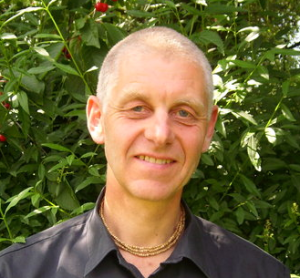
In the following we will discuss the article “No More Cattle Raising on the Planet of the Trees” that was recently posted on the Dandavats website (http://www.dandavats.com/?p=14403).
The author attempts to prove that Srila Prabhupada instructed his editors to make changes and corrections to his books after his disappearance. In support of his conclusions the author quotes from the “Rascal Editors” conversation and from a mail exchange between Ramesvara Dasa and Tamala Krishna Goswami.
A careful analysis, however, reveals that the author’s conclusions are invalid. He is correct when he says that after the “Rascal Editors” conversation Srila Prabhupada approved that further editing could be performed. This is revealed in the mail exchange between Ramesvara Dasa and Tamala Krishna Goswami (see Appendix 2 in the author’s article). But his conclusions about HOW editing could be continued, and FOR HOW LONG it could be continued are fallacious. He specifically commits three logical fallacies that invalidate his conclusions:
- SELECTIVE EVIDENCE/CHERRY PICKING
- NON SEQUITUR
- TAKING A QUOTE OUT OF CONTEXT/CONTEXTOMY
In order to properly understand Srila Prabhupada’s last instructions on editing (that we know of) we have to take a closer look at the letter Tamala Krishna Goswami wrote Ramesvara Dasa (see Appendix 2 in the author’s article), because a crucial sentence has been left out of the author’s analysis (reproduced here in bold):
“Your suggestion that in the future any mistakes which are found can be reported to Satsvarupa Maharaja, Jayadvaita Prabhu, Radha Ballabha Prabhu, or yourself, and after sufficient investigation and confirmation these mistakes can be rectified is accepted. As we are working on this Fifth Canto planetary system, whatever corrections are required to be made, we will get approved by His Divine Grace and then send them on to you so that the new edition will be free from any of these discrepancies.“
[…]
“Although He has certain doubts in regard to the perfectness of our service, He is quite confident that you will do the needful to make any corrections that are required. [handwritten:] I explained the contents of your letter and Satsvarupa’s, and Radhaballabha and He seemed satisfied that things were not being unauthorizedly changed, while at the same time whatever corrections needed to be done were being made.” (Letter to Ramesvara from Tamala Krishna, July 22, 1977)
From these quotes we can understand that Srila Prabhupada did not want any more editing that was not “sufficiently investigated” and “confirmed”. Nothing should be “unauthorizedly changed”. Now, the questions is:
WHO will ultimately confirm and authorize the editing?
We get a hint about whom by looking at the sentence that the author has left out:
“As we are working on this Fifth Canto planetary system, whatever corrections are required to be made, we will get approved by His Divine Grace…”
So it seems the four above mentioned devotees were not just changing the books themselves. They were sending their changes to Srila Prabhupada for final approval. This seems to be the procedure that Tamala Krishna Goswami is talking about.
By leaving the sentence about the edits to the fifth canto out the author commits the fallacy of “selective evidence” http://en.wikipedia.org/wiki/Cherry_picking_(fallacy).
Some might argue that MAYBE the changes to the fifth canto were the only changes that were sent to Srila Prabhupada, and not any other changes. But “maybe” is guesswork. And we do not make changes to the books of the acaryas based on guesswork (maybe, I think, perhaps etc). A principle of caution must be observed in editing Srila Prabhupada’s books. Better safe than sorry!
So contrary to what the author argues we find no evidence in the exchange between Ramesvara Prabhu and Tamala Krishna Goswami to support the conclusion that these four above mentioned devotees could edit without having Srila Prabhupada approve or disapprove all their changes.
The author’s conclusion about posthumous editing simply does not follow from it’s premises, and therefore he also commits the logical fallacy “non sequitur” (http://en.wikipedia.org/wiki/Non_sequitur_(logic)) which cover all arguments in which the conclusion does not follow from the premises.
Another very important point is that neither in the “Rascal Editors” conversation nor in the exchange between Tamala Krishna Goswami and Ramesvara Dasa do we find any information about posthumous editing. They were spoken/written within a context where Srila Prabhupada was around to approve or disapprove the editing work of BBT. The conversation and the letters came into existence because Srila Prabhupada and some of his disciples were dissatisfied with some of the editing work done by the BBT – not because anyone asked Srila Prabhupada about how editing should be done after his disappearance.
The burden of proof is on the devotee who states that we can project, extend or expand the instructions given by Srila Prabhupada on book editing from one context (when he was around) into a completely different context (when he is no longer around). In connection with the book changes no one has been able to lift this burden of proof successfully, and the author’s attempt also fails:
The author argues that since the letter written by Tamala Krishna Goswami states that “in the future” the editing should follow the above mentioned procedure, and since Srila Prabhupada never asked them to stop this procedure, therefore this procedure must still be followed after Srila Prabhupada’s disappearance. There are several problems with this argument:
- The letter was signed by Srila Prabhupada, but was written by Tamala Krishna Goswami. So we cannot know for certain how Srila Prabhupada understood and interpreted the words “in the future”. We cannot even be sure he took special notice of the words.
- We humans often use “in the future we should do such and such” in a very unspecified way – and often it is implicit that there is a timeframe involved, or that if certain factors are changed then the procedure must also be changed or stopped. For example, if I tell my wife that “in the future” the procedure is that she should have my breakfast ready at 9:00a.m., then I do not also have to state the obvious fact that if I die today, then she should stop that practice tomorrow. Similarly, based on sastra and Srila Prabhupada’s clear instructions on the arsa-prayoga principle it can be argued that he did not also have to tell his editors that if he leaves his body, then they should stop the editing. At least there is NO PROOF for the contention that the editing should continue.
- If one states that the words “in the future” also refers to the time after Srila Prabhupada left his body, then one is clinging to the same faulty reasoning as the ritviks. Ritviks state that the word “henceforward” in the famous July 9th letter (also written by Tamala Krishna Goswami and signed by Srila Prabhupada) should be taken to mean that ritvik initiations should continue after Srila Prabhupada’s disappearance. But neither the author nor any other ISKON leader will accept that interpretation of the word “henceforward” in the July 9th letter. Thus they have a double standard – i.e. they apply a different set of principles for similar situations. Unless the author wants to fall prey to the same faulty reasoning as the ritviks, he has to admit that there is no proof that “in the future” refers to the time after Srila Prabhupada’s disappearance.
Summing this point up:
Nothing seems to suggest that the instructions on book editing given by Srila Prabhupada in the “Rascal Editors” conversation and in the exchange between Ramesvara Dasa and Tamala Krishna Goswami can be extrapolated into a context where Srila Prabhupada is no longer around. So by insisting on this unjustified extrapolation the author is effectively invalidating his own argument by committing the logical fallacy of quoting out of context/contextomy (http://en.wikipedia.org/wiki/Fallacy_of_quoting_out_of_context).
We do not have one single instruction from Srila Prabhupada where he allows for posthumous editing of his books. However, he actually taught us how to deal with the transcendental mistakes of the acaryas.
First of all he gave philosophical instructions about the dangers of violating the arsa-prayoga principle:
“If one is too big, there is no mistake. Arsa-prayoga means there may be discrepancies but it is all right. Just like Shakespeare, sometimes there are odd usages of language, but he is accepted as authority. I have explained all these things in my Preface to First Canto.” (Letter to Mandali Bhadra, Jaipur 20 January, 1972)
“So unless one is self-realized, there is practically no use writing about Krsna. This transcendental writing does not depend on material education. It depends on the spiritual realization. You’ll find, therefore, in the comments of Bhagavatam by different acaryas, even there are some discrepancies, they are accepted as arsa-prayoga. It should remain as it is.”
(Srimad-Bhagavatam 7.5.23-24, Vrndavana, March 31, 1976)
Prabhupada: This of should be strictly forbidden.
Radha-vallabha: So no corrections. That makes it simple.
Prabhupada: They can divide the synonyms. That’s all.
Radha-vallabha: Synonyms. So even…
Prabhupada: That is his tendency, to correct. That’s very bad. He should not do that.
Radha-vallabha: So I’ll just forget this, then.
Prabhupada: The system is: whatever authority has done, even there is mistake, it should be accepted.
Radha-vallabha: Oh.
Prabhupada: Arsa-prayoga. That is ha… He should not become more learned than the authority. That is very bad habit….
[…]
Prabhupada: Why finish it? Whatever is done is done. No more….
Radha-vallabha: Well, now that this system of no corrections anywhere, that makes it very simple. Then he can’t do anything. I don’t think he wants to, either. It makes it more simple for him. It makes him very uncomfortable.
Prabhupada: No corrections.
(Room Conversation 27 february, 1977)
Srila Prabhupada also taught us by his own practical example. The article “Srila Prabhupada’s Instructions on editing are in his own books” (by Prahlada Nrisimha Dasa) reveals how Srila Prabhupada himself dealt with the transcendental mistakes made by the previous acaryas (he did not change or touch them). Here are two examples from the article:
“In the Caitanya-caritāmṛita, Madhya-līlā 9.358, Srila Prabhupāda cites his spiritual master Śrīla Bhaktisiddhānta Sarasvatī Ṭhākura, who points out that in the seventy-fourth verse of this same chapter there is an apparent error made by Kṛṣṇa dāsa, Kavirāja Gosvāmī. Srila Prabhupāda, just to teach us the principle of arsa-prayoga, [please see quotes from Srila Prabhupāda on “arsha-prayoga” at the end of this article] does not touch the words of Kṛṣṇadāsa Kaviraja Goswami, but leaves this apparent error as it is, out of respect for the transcendental book. Even though Srila Prabhupāda’s own spiritual master, the most pure and intimate confidential devotee and associate of Lord Kṛṣṇa and Sri Caitanya Mahāprabhu himself, had clearly pointed out that this is an apparent error and is apparently wrong.
Furthermore in the purport to that seventy-fourth verse, mentioned above, Srila Prabhupada mentions nothing; only at the end of the chapter, after Srila Kṛṣṇadāsa Kaviraja concludes his narration, does Srila Prabhupāda even mention the apparent mistake.
That Caitanya-caritāmṛita, Madhya-līlā 9. 358 purport is cited here for your reference:
“Śrīla Bhaktisiddhānta Sarasvatī Ṭhākura points out that in the seventy-fourth verse of this chapter it is stated that Śrī Caitanya Mahāprabhu visited the temple of Śiyālī-bhairavī, but actually at Śiyālī, Śrī Caitanya Mahāprabhu visited the temple of Śrī Bhū-varāha. Near Śiyālī and Cidambaram there is a temple known as Śrī Muṣṇam. In this temple there is a Deity of Śrī Bhū-varāha. In the jurisdiction of Cidambaram there is a district known as southern Arcot. The town of Śiyālī is in that district. There is a temple of Śrī Bhū-varāhadeva nearby, not Bhairavī-devī. This is Śrīla Bhaktisiddhānta Sarasvatī Ṭhākura’s conclusion.”
This is a very good lesson to make a clear and prominent note of how Srila Prabhupāda, the teacher by example, has chosen to edit (or rather not edit) the words of the spiritual masters or previous acharyas’ writings.”
[…]
“We will cite another place were Srila Prabhupāda left a seeming mistake as it is, even though it may be considered “wrong.”
“Ambikāvana is situated somewhere in the Gujarat province. Ambikāvana is said to be situated on the river Sarasvatī, yet we do not find any Sarasvatī River in the Gujarat province; the only river there is Savarmati. In India, all the big places of pilgrimage are situated on nice rivers like the Ganges, Yamunā, Sarasvatī, Narmadā, Godāvarī, Kāverī, etc. Ambikāvana was situated on the bank of Sarasvatī, and all the cowherd men and Nanda Mahārāja went there.” (KRSNA Book 1970 edition Volume 1 Chapter 33 / Vidyādhara Liberated and the Demon Śaṅkhāsura Killed)
In this quote from Srila Prabhupāda’s original KRSNA book, Prabhupāda mentions that although it says, “Ambikāvana is said to be situated on the river Sarasvatī, yet we do not find any Sarasvatī River in the Gujarat province…” Prabhupāda does not change the text to correct the seeming mistake.” (Prahlada Nrisimha Dasa, Srila Prabhupada’s Instructions on editing are in his own books)
The article has additional examples and many other interesting points in regard to the topic of book changes.
Sastra also confirms that the mistakes of the acaryas should not be corrected:
“Anyone who finds any fault with a devotee’s description of Krishna is a sinner. If a devotee writes a poem, no matter how poorly he does it, it will certainly contain his love for Krishna. A fool says ‘visnaya’ while a scholar knows the correct form is ‘visnave’, but Krishna accepts the sentiment in either case. If anyone sees a fault in this, the fault is his, for Krishna is pleased with anything the pure devotee says. You too describe the Lord with words of love, so what arrogant person would dare criticize anything that you have written?” (Chaitanya Bhagavata 1.11.105-110)
The conclusion is that there is no mention of posthumous editing in Srila Prabhupada’s teachings other than:
1) The clear statements about not changing the works of an acarya (the arsa-prayoga principle).
2) Srila Prabhupada’s own example of not touching the mistakes of the previous acaryas.
3) Sastric injunctions on not to correct the mistakes of the acaryas.
As cited above Tamala Krishna Goswami writes to Ramesvara Dasa:
“Your suggestion that in the future any mistakes which are found can be reported to Satsvarupa Maharaja, Jayadvaita Prabhu, Radha Ballabha Prabhu, or yourself, and after sufficient investigation and confirmation these mistakes can be rectified is accepted.” (Letter to Ramesvara from Tamala Krishna, July 22, 1977)
Besides the obvious problem that none of the changes made post-1977 can be approved by Srila Prabhupada, there is also the problem that HARDLY ANY of the changes made to the Gita have been “sufficiently investigated”. The changes were made by Jayadvaita Swami – more or less alone. And as we see there are many discrepancies in his editing. And most of his changes are directly violating clear instructions from Srila Prabhupada. For example, Srila Prabhupada did not want any needless changes.
“As you know, and as we kept in mind while doing the work, Srila Prabhupada staunchly opposed needless changes.” (Jayadvaita Swami, Letter to Amogha Lila, 1986)
But the Gita (and other books) is filled with thousands of needless changes. Many of these are mentioned in the e-book “No Reply from BBTI” which is easily found by searching the internet.
This e-book shows how the attempted justifications used by the BBTI are very problematic. BBTI usually argue that:
- We are changing Srila Prabhupada’s books back to what he actually said in his original manuscript.
- We are making the book “Closer to Prabhupada”.
- We are only correcting grammar, commas, capitalization etc.
- We are only correcting the mistakes of previous editors.
- No unnecessary changes have been made.
But the articles in the e-book documents that the BBTI has needlessly:
- Deleted many of Srila Prabhupada’s own chosen words and sentences (even those also found in his ”original manuscript”).
- Added their own words and sentences (which means these words and sentences are also not to be found in the ”original manuscript”).
- Changed Srila Prabhupada’s own personally typewritten sanskrit translations.
- Made needless change of syntax (sentence structure).
So even if we – for the sake of argument – accept the conclusion that some changes could be made posthumously (for which there is no evidence), then we would still be in a situation where the BBTI has violated the instructions on how Srila Prabhupada wanted his books edited while he was still around to supervise the work.
All the articles in “No Reply from BBTI” have been sent to Jayadvaita Swami, Dravida Dasa, BBTI and the author of “No More Cattle Raising on the Planet of the Trees”. But so far we have received no replies to the points raised – hence the name “No Reply from BBTI”.
We humbly ask you to read this e-book, and also visit the many different websites made by devotees who are skeptic towards the changes to Srila Prabhupada’s books. The author of this article shall promptly send you links to “No Reply from BBTI” and other relevant websites on your request.
Your servant, Ajit Krishna Dasa


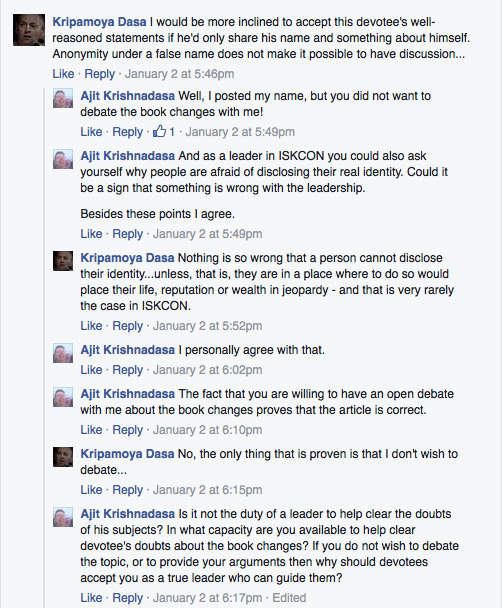


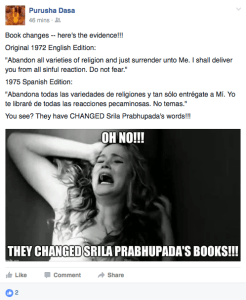


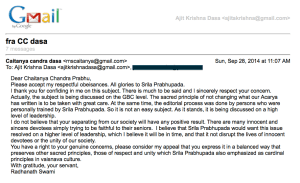
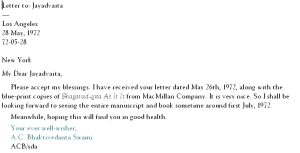


You must be logged in to post a comment.